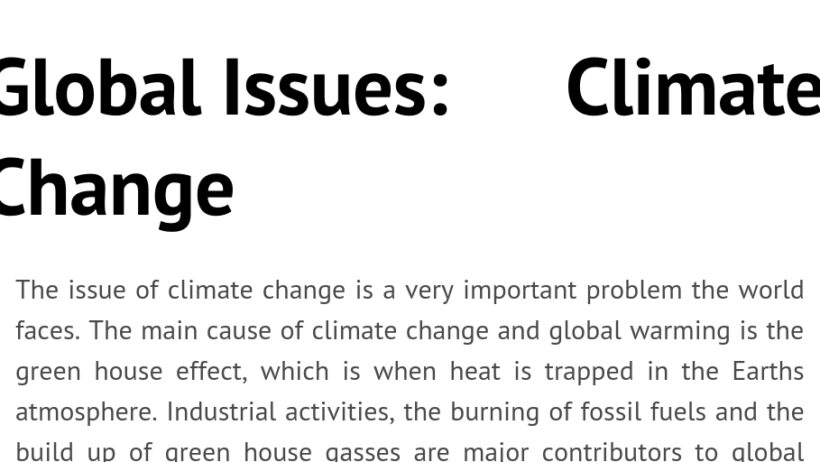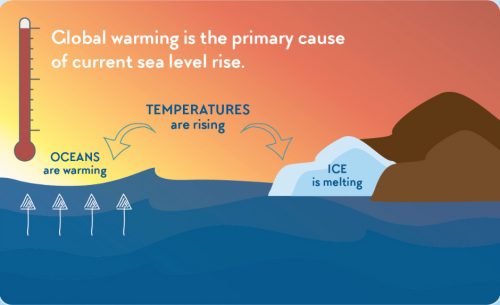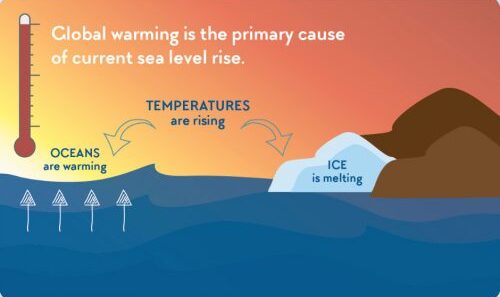Climate change is not a distant concern relegated to the future; it is an omnipresent crisis that is reshaping our planet in tangible and alarming ways. Understanding the complexities of climate change requires unpacking multiple dimensions, each interwoven with one another like an intricate tapestry. This article explores the multifaceted challenges presented by climate change, inviting readers to rethink their relationship with the environment and reconsider the urgency of the situation.
The foremost challenge lies in the rising global temperatures, driven primarily by anthropogenic greenhouse gas emissions, predominantly carbon dioxide and methane. The Intergovernmental Panel on Climate Change (IPCC) underscores that the Earth’s surface temperature has increased by approximately 1.2 degrees Celsius since the late 19th century. While this might appear trivial on a fractional scale, the ramifications are anything but negligible.
Consider the polar ice caps, which are retreating at an alarming rate. This melt contributes to rising sea levels, threatening low-lying coastal communities and entire nations with the prospect of submersion. Coastal cities like Miami, New York, and Lagos are already experiencing heightened flooding. The gloomy forecast extends beyond mere geography; it jeopardizes the livelihoods of millions and disrupts ecosystems, as both flora and fauna struggle to adapt to rapidly changing habitats.
Water scarcity is another pressing issue exacerbated by climate change. As global averages rise, leading to alterations in precipitation patterns, certain regions are suffering from extreme drought while others face overwhelming floods. Water sources that once sustained entire communities are dwindling. The competition for this vital resource will only intensify, potentially igniting conflicts and exacerbating socio-economic disparities. Countries in the Horn of Africa, for instance, face dire food insecurity as agricultural cycles falter under the strain of unpredictability.
Climate change also has profound implications for biodiversity. The planet’s ecosystems are not merely backdrops to human activity; they are complex networks teeming with life that rely on balance. The phenomenon of species extinction has accelerated dramatically, with Earth currently experiencing the sixth mass extinction event. Habitat destruction, pollution, and climate-induced changes are pushing countless species to the brink, robbing future generations of biodiversity and the irreplaceable benefits it offers.
The economy is yet another arena feeling the pinch of climate change. Industries reliant on natural resources—agriculture, fishing, and forestry—are confronting unprecedented volatility. The insurance sector, too, is grappling with an increase in the frequency and severity of natural disasters induced by climate change. In the United States alone, the National Oceanic and Atmospheric Administration (NOAA) reported a record number of billion-dollar weather and climate disasters. These events not only strain public resources and emergency services but also impose crippling costs on individuals and industries alike.
Moreover, the health implications are equally alarming. A warming planet provides fertile ground for the proliferation of vector-borne diseases as mosquitoes and ticks thrive in increasingly temperate regions. Heatwaves claim lives, particularly among vulnerable populations. The World Health Organization projects that, by 2030, climate change will cause an additional 250,000 deaths annually from malnutrition, malaria, diarrhea, and heat stress. The intertwining of public health and climate action is thus crucial; neglecting one inevitably undermines the other.
Perhaps one of the most insidious aspects of climate change is its disproportionate impact on marginalized communities. Vulnerable populations—those least responsible for the crisis—often bear the brunt of its effects. Low-income neighborhoods, which frequently lack the infrastructure to cope with natural disasters, face heightened vulnerability. The principles of environmental justice dictate that those who contribute the least to climate change should not be those who suffer its most devastating consequences. Addressing these inequities is not merely ethical; it is crucial for fostering a resilient future for all communities.
In the wake of these daunting challenges, solutions are possible, beckoning a crucial shift in perspective. An immediate pivot towards renewable energy sources—such as solar, wind, and hydroelectric power—represents a vital step. These technologies not only reduce greenhouse gas emissions but also signify a move away from finite resources towards more sustainable practices. Efforts to increase energy efficiency in homes, industries, and transportation systems can further mitigate the crisis.
Circular economy practices also offer a promising pathway. By rethinking consumption and waste management, industries can create systems that ensure resources are reused and repurposed, effectively closing the loop. Shifting societal norms around consumption—valuing experiences over possessions and focusing on sustainability—can help drive this change. Businesses and consumers alike must take proactive steps to reduce waste and minimize carbon footprints.
Ultimately, the fight against climate change necessitates collaboration on an unprecedented scale. International agreements, like the Paris Agreement, function as pivotal frameworks to unify nations in this struggle. Collective commitments to set and meet emissions targets are imperative, demanding accountability across borders and sectors. Civil society, too, has a foundational role—the rise of grassroots movements underscores the populace’s determination to advocate for meaningful change.
In summary, climate change presents an assortment of challenges that intertwine and amplify one another. From rising temperatures and biodiversity loss to water scarcity and socio-economic disparities, the repercussions are dire and far-reaching. However, this crisis beckons an opportunity for transformative action—urging a united front towards sustainable practices, equitable solutions, and global cooperation. The story of climate change is a call to arms, urging every individual, community, and country to engage actively in crafting a viable future for our planet.






